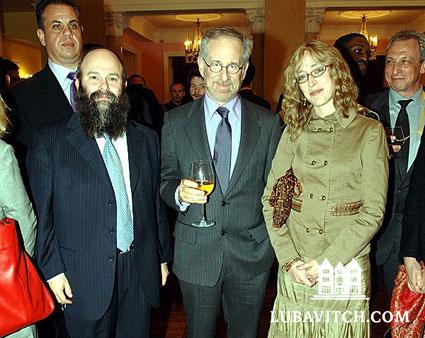If you want to ensure continuity of Ukrainian Jewry, Stephen Spielberg told an audience of 2,000, a majority among them Jewish, you must “return to your roots.” Spielberg shared these thoughts last week when he made his debut in his ancestral home, to attend the screening of his documentary film, Spell Your Name. Ukraine’s President, Viktor Yuschenko, Prime Minister Viktor Yanukovych and heads of Parliament turned out to preview the film.
Directed by Ukrainian filmmaker Sergei Bukovsky and produced by Spielberg together with Ukrainian steel magnate Viktor Pinchuk, the documentary tells the story of survivors of Nazi atrocities against Ukrainian Jews, their rescuers, and even the young film assistants as they were affected by their work. The film is based on the testimonies from among the 52,000 interviews archived in the USC Shoah Foundation Institute, a Los Angeles-based organization founded by Spielberg in 1994.
The producer of numerous holocaust films, most famously among them, Schindler’s List, Spielberg, 59, is well known for his passion about educating future generations about the Holocaust. “Hearing the stories of Holocaust survivors from all over the world is going to change the world, and already has,” he said at a press conference. But in speaking to the Jewish community, the grandson of Ukrainian Jews went the next step, admitting that while as a child growing up in Arizona he was ambivalent about his Jewish identity, as a father, he realized that if he wants his children to be Jewish, he needs to assert his Jewish identity.
“In all of the 17 years I’ve been here,” conceded Chabad’s Rabbi Shmuel Kaminezki, who sits at the helm of the Dnepropetrovsk’s Jewish educational and social services programs, “I’ve never heard a speaker make such a deep impression on the local Jewish community.” Spielberg joined Rabbi Kaminezki with his co-producer, Victor Pinchuk, a close friend of Kaminezki’s and patron of the largest foundation for Jewish education serving 160 Jewish communities in Ukraine, for an elegant, kosher dinner. Spielberg was heartened, Rabbi Kaminezki told Lubavitch.com, to learn of the comprehensive Jewish renaissance in Ukraine.
The dramatic contrast of a region now flourishing with the full gamut of Jewish educational, social and religious activity, to that of Ukraine of September 1941, was not lost on this filmmaker. Last month, Ukraine marked the 65th anniversary of the infamous Babi Yar massacre, the prelude to Nazi atrocities against Ukrainian Jews. Within 48 hours of the Nazi occupation of Kiev, 33,700 Ukrainian Jews were rounded up and shot to death at the edge of a deep ravine in Babi Yar. In all, nearly 1.5 million of Ukraine’s Jews were exterminated during the WWII.
Today, there are 200,000 Jews living in Ukraine.

Be the first to write a comment.